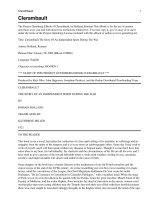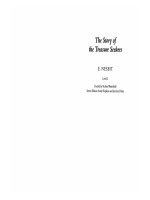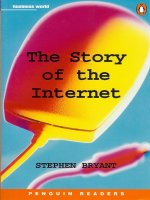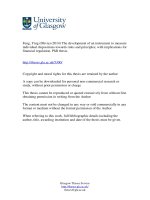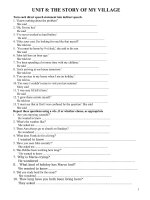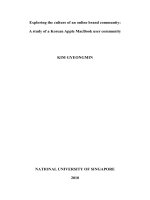The Story of an Hour Essay
Bạn đang xem bản rút gọn của tài liệu. Xem và tải ngay bản đầy đủ của tài liệu tại đây (74.82 KB, 3 trang )
Reflective Essay Writing: Write a short essay to this question: In your
opinion, why id Kate Chopin end Mrs. Mallard’s destiny at the end of
the story?
ESSAY
The Story of an Hour" by Kate Chopin is a powerful story from the late nineteenth
century focusing on a young woman, Mrs. Mallard whose husband is thought to be
dead. I have a great impression about this story because its the end. After seeing
her husband alive, she was died immediately. So why did Kate Chopin end Mrs.
Mallard’s destiny after she has just seen her husband coming into the house at the
end of the story? What message do the author brings to you?
"The Story of an Hour" is a short story written by Kate Chopin on April 19, 1894,
and was originally published in Vogue on December 6, 1894, as "The Dream of an
Hour". It was then reprinted in St. Louis Life on January 5, 1895, as "The Story of
an Hour". The short story describes the series of emotions Louise Mallard endures
after hearing of the death of her husband, Brently, who was believed to have died
in a railroad disaster. Mrs. Mallard suffers from heart problems; therefore, her
sister and friend attempt to inform her of the horrific news in a gentle way. Mrs.
Mallard locks herself in her room to immediately mourn the loss of her husband.
However, she begins to feel an unexpected sense of exhilaration. "Free! Body and
soul free!" is what she believes is a benefit of his death. When she hears her
husband enter the house, she suffers a heart attack upon receiving the shock that he
has not died after all. He hears a scream and runs up to see the body of his dead
wife lying on the ground. So, why did Kate Chopin end Mrs. Mallard's destiny at
the end of the story? Are there any meanings for this conclusion?
Once can say that Kate Chopin gave a very happy ending. First of all, I am of the
opinion that it is a happy ending for society at that time. Based on the story, all
people thought that Mrs. Mallard died because she was extremely hilarious and
happy, is due to her husband's returning. Her death illustrated that she is a very
faithful wife, a submissive woman. It is totally suitable for social preconception.
“Be free, be yourself” is the basic right for women in Western modern society but
in the late 1800s, this requirement was out of control of society. That was the
reason why Kate Chopin created her daring pieces, not only “The Story of An
Hour” but also “The Awakening” and so on… In late stories, she explored
women’s issues considered controversial in her time. Reading “The Story of An
Hour”, we could see easily that she was a woman who had a dream of freedom.
Kate Chopin showed the desire to be free, thoughts, choices, and decisions of
Louise, which was a tremendous dream. This was expressed through her life, too.
She had chosen a lonely life to live and feed her children by own her ability after
her husband passed away. She wanted to prove everyone in her time that women
totally could do anything without needing someone’s help.
Beside the meaning of this ending is a happy ending for society in that time, we
can see that this ending is also a happy ending for Mrs. Mallard. We see Louise as
she found happiness out of her husband’s death and yet, by the narration, we see
her struggle with guilt and overcome it. Evolution character's mood changed from
time to time. When she found out her husband has died in a train wreck. She
reacted with sadness at first, but then realized in a rush of emotion and relief that
she is “Free! Body and soul free!” She viewed the world with a fresh outlook - one
where she will be her own person, answering only to herself. She was ready to
begin this new life when her husband - who evidently wasn’t on the train after all comes home. She died from heart failure on the spot. Louise is obviously the
character of interest - through her we see the social repression that women felt at
the time. Louise represents all women of the time. They were locked into
marriages that were probably loving - at least Louise says her husband “never
looked at her save with love”, but were oppressive in their treatment of women.
She was ready for a long and happy life by herself. And when her husband was
alive, these feelings of hers were dead. Louise Mallard had enjoyed her freedom
for only one hour. And we all know that is the truly cause of her death Chopin
regarded contemporary society as degrading to women, who were allotted limited
roles in a male-dominated world. Just as the death of her husband sets Louise’s
body free, so, too, does it free her spirit to find happiness in any way that she
wishes. Her husband’s return shattered her hopes. She was again a mere wife,
subservient. This sudden reversal, the destruction of her dreams, killed her. Still,
she was spared the living death of a stifling relationship, and before she thought
her husband was dead she had dreaded a long life. The story’s ending is therefore
ironic but not tragic because Louise does escape marriage in the only way now
open to her that is death. From the female perspective, it could be argued that her
death was really an ultimate freedom from her unhappy marriage. But there was
some argument about this ending, they assumed that the reader is male, it could be
that her death was a punishment for her happiness at the death of her husband. But
after all, we can admit that this ending is a happy ending for both for society of this
time and for Mrs. Mallard..
To sum up, I think this is a perfect solution for Louise, she is free, rescue from
cramped marriage that don’t be criticize by the society at that time. Beside that
Kate Chopin wanted to tell us let "Live life to the fullest while you can".

